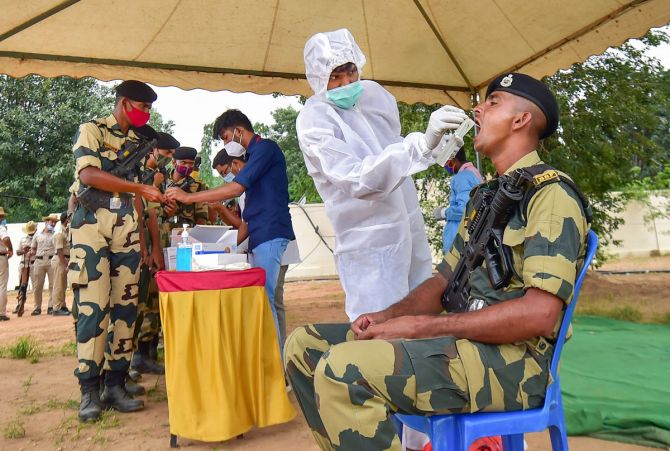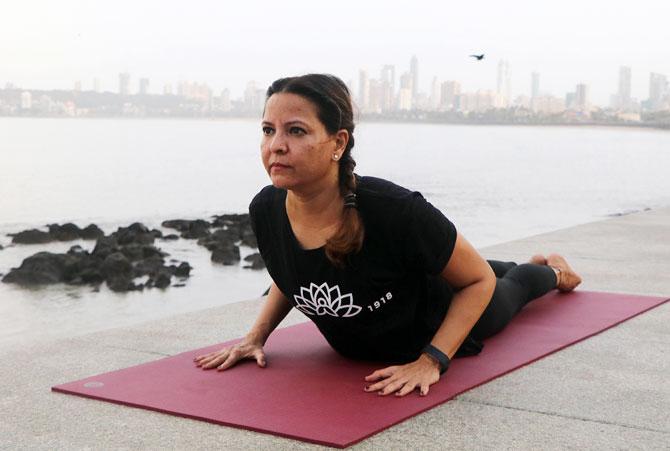The perfect routine already exists.
It is the one designed by nature and is called the Circadian Rhythm.
If we are able to align to this routine, according to the Circadian Rhythm, it will help restore, regain, and reset our health in a huge way.

Photograph: Shailendra Bhojak/PTI Photo
COVID-19 forced people to stay indoors, maintain social distancing and limit social contact to slow down the virus.
All these measures resulted in social isolation and loneliness among many, especially people staying alone and senior citizens.
The limited social interactions have ended up making people feel depressed and anxious.
"Each of us must know that mental health is as crucial as our physical health, and shouldn't be ignored," says Luke Coutinho, co-founder, RESET, a holistic wellness centre located in Mumbai and Bengaluru.
One needs to first understand if they are depressed or are just going through a depressing event in their lives, and then work towards seeking help.
"Victimising yourself towards a particular situation and saying things like 'why me', is only going to make you feel worse," Luke advises.
"A lot of people have just termed and tagged themselves as depressed. It is important to understand the significance of how we tag ourselves."
In Part III of an interview with Anita Aikara/Rediff.com, Luke shares a daily routine that people can follow to stay positive during a pandemic.
"It is the one designed by nature and is called the Circadian Rhythm.
"It gives us a perfect framework of when we should wake up, eat as per the right timings, sleep, wind down, etc.
"If we are able to align to this routine, according to the Circadian Rhythm, it will help restore, regain, and reset our health in a huge way."
- PART 1: 'Youngsters are most affected'
- PART 2: How to SURVIVE the Third Wave

Photograph: Swapan Mahapatra/PTI Photo
When should one seek help?
Depression and anxiety are very loosely used terms these days.
While there are genuine cases of depression, and no matter what one does, they continue feeling depressed and are stuck in a negative spiral of emotions.
A lot of people have just termed and tagged themselves as depressed.
It is important to understand the significance of how we tag ourselves.
We might not be depressed, but going through a depressing event in our lives.
Having said that, one must consider seeking professional help and counselling sessions from an expert if:
- They aren't feeling better despite adopting powerful tools such as meditation and healing.
- Their emotions and thoughts are affecting their day-to-day quality of life.
- They are having suicidal thoughts, insomnia, tendencies to harm themselves or just feeling hopeless about their life.
- Unable to overcome loss of a loved one or find closure at the end.
Each of us must know that mental health is as crucial as our physical health, and shouldn't be ignored.
There are genuine cases of true chemical imbalance in the body, where our body isn't able to produce the right amount of neurotransmitters like dopamine or serotonin to feel good, and in such cases we must be open to seeking help.

Photograph: Kunal Patil/PTI Photo
What are the few things people can do to remind themselves that they are not alone during this pandemic?
1. Stay informed, but just avoid staying glued to news channels to extract every bit of information.
Being up to date will give you an idea about a situation at a macro level and help you understand the fact that each one of us are dealing with the same situation.
2. Don't play victim mode. Victimising yourself towards a particular situation and saying things like 'why me', is only going to make you feel worse.
Understand that it is not just you, but everyone around.
The pandemic has affected every single one of us, although at varying levels.
3. Checking in on your loved ones every now and then.
This helps bring about a sense of calm and will make us feel like we have some strong connections and company to get through this pandemic.
Staying in touch can help maintain closeness even when you can't be with that person.
4. Joining support groups can help you connect with people who might be going through a situation similar to yours.
There are various support groups, helpline numbers one could consider joining.
5. Avoid doom scrolling on social media.
While it may appear that social media is a great tool to engage and interact with others, it can also trigger feelings of loneliness and FOMO.
Seeing others spending time with family, partners and kids can make you compare your life with theirs.

Kindly note the image has been posted only for representational purpose.
Photograph: Hitesh Harisinghani/Rediff.com
Could you suggest a daily routine that people could follow?
The perfect routine already exists.
It is the one designed by nature and is called the Circadian Rhythm.
It gives us a perfect framework of when we should wake up, eat as per the right timings, sleep, wind down, etc.
It is now upon us on how aligned we remain to this perfect routine.
If we are able to align to this routine, according to the Circadian Rhythm, it will help restore, regain, and reset our health in a huge way.
There are 9 rules to Circadian Rhythm:
1. Waking up with the rising sun.
2. Avoid looking at gadgets right after waking up, and use this time to connect within with nature, soak up natural sunlight and expose yourself to nature in any way possible.
3. Avoid eating anything until the sun rises.
4. Consume coffee or tea only after three hours of waking up.
5. Eat, workout, sleep, and wake up around the same time every day to build a rhythm.
6. Consume maximum calories during breakfast and lunch, and minimum during dinner. Let dinner be the leanest meal of the day.
7. Eat the last meal of the day before or during sunset and fast through the night (dry or intermittent, based on whatever is comfortable) and only break it the next day after sunrise.
This automatically results in a 12-hour effortless fast in the most natural way.
8. Keep a 2 or 3-hour gap between dinner and bedtime.
9. Disconnect from blue/artificial light close to bedtime. Such kinds of lights suppress melatonin secretion.
This should be done at least 1-2 hours before bedtime, the earlier the better.
Plan your day if you want to fit in television or other modes of recreation.
By far, these 9 rules or guidelines have been the most powerful lifestyle changes people have made during the lockdown and there have been thousands of positive testimonials from people who have benefitted from it.











 © 2025
© 2025